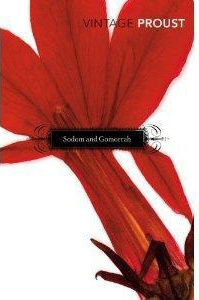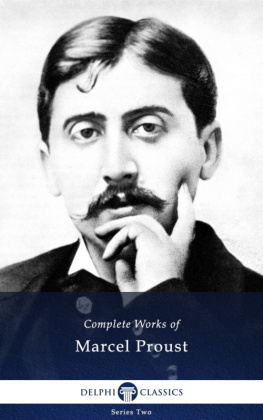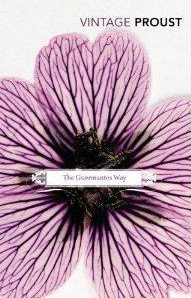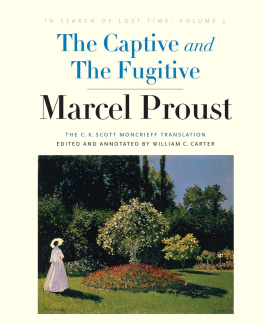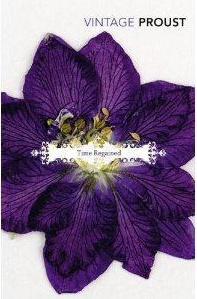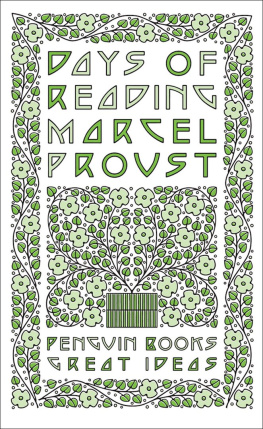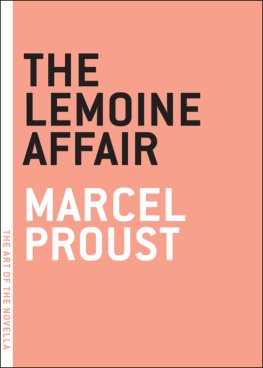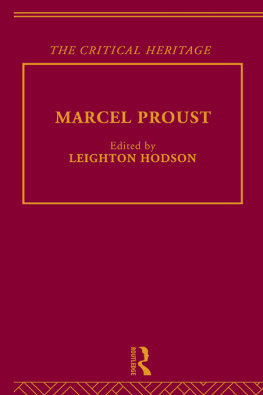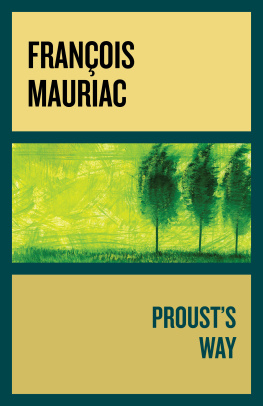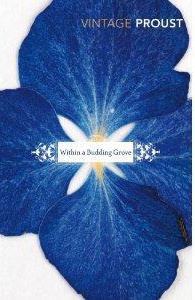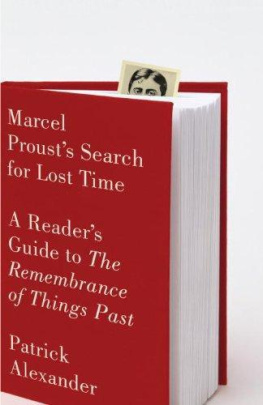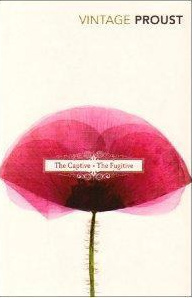Marcel Proust - Remembrance of Things Past 04 - Sodom and Gomorrah
Here you can read online Marcel Proust - Remembrance of Things Past 04 - Sodom and Gomorrah full text of the book (entire story) in english for free. Download pdf and epub, get meaning, cover and reviews about this ebook. genre: Detective and thriller. Description of the work, (preface) as well as reviews are available. Best literature library LitArk.com created for fans of good reading and offers a wide selection of genres:
Romance novel
Science fiction
Adventure
Detective
Science
History
Home and family
Prose
Art
Politics
Computer
Non-fiction
Religion
Business
Children
Humor
Choose a favorite category and find really read worthwhile books. Enjoy immersion in the world of imagination, feel the emotions of the characters or learn something new for yourself, make an fascinating discovery.
- Book:Remembrance of Things Past 04 - Sodom and Gomorrah
- Author:
- Genre:
- Rating:4 / 5
- Favourites:Add to favourites
- Your mark:
- 80
- 1
- 2
- 3
- 4
- 5
Remembrance of Things Past 04 - Sodom and Gomorrah: summary, description and annotation
We offer to read an annotation, description, summary or preface (depends on what the author of the book "Remembrance of Things Past 04 - Sodom and Gomorrah" wrote himself). If you haven't found the necessary information about the book — write in the comments, we will try to find it.
Remembrance of Things Past 04 - Sodom and Gomorrah — read online for free the complete book (whole text) full work
Below is the text of the book, divided by pages. System saving the place of the last page read, allows you to conveniently read the book "Remembrance of Things Past 04 - Sodom and Gomorrah" online for free, without having to search again every time where you left off. Put a bookmark, and you can go to the page where you finished reading at any time.
Font size:
Interval:
Bookmark:
Vol. 4 of Remembrance of Things Past
Translated from the French by C. K. Scott Moncrieff
(Sodom et Gomorrhe, Tome 4 of
la Recherche du temps perdu)
Table of Contents
Introducing the menwomen, descendants of those of the inhabitants of Sodom who were spared by the fire from heaven.
M. de Charlus in SocietyA physicianTypical physiognomy of Mme. de VaugoubertMme. d'Arpajon, the Hubert Robert fountain and the merriment of the Grand Duke VladimirMmes. d'Amoncourt, de Citri, de SaintEuverte, etc.Curious conversation between Swann and the Prince de GuermantesAlbertine on the telephoneMy social life in the interval before my second and final visit to BalbecArrival at Balbec.
The mysteries of AlbertineThe girls whom she sees reflected in the glassThe other womanThe liftboyMadame de Cambremer.
The pleasures of M. Nissim Bernard (continued)Outline of the strange character of MorelM. de Charlus dines with the Verdurins.
The sorrows of M. de CharlusHis sham duelThe stations on the "Transatlantic"Weary of Albertine, I decide to break with her.
Sudden revulsion in favour of AlbertineAgony at sunriseI set off at once with Albertine for Paris.
INTRODUCTION
Introducing the men-women, descendants of those of the inhabitants of Sodom who were spared by the fire from heaven.
La femme aura Gomorrhe et l'homme aura Sodome. Alfred de Vigny.
The reader will remember that, long before going that day (on the evening of which the Princesse de Guermantes was to give her party) to pay the Duke and Duchess the visit which I have just described, I had kept watch for their return and had made, in the course of my vigil, a discovery which, albeit concerning M. de Charlus in particular, was in itself so important that I have until now, until the moment when I could give it the prominence and treat it with the fulness that it demanded, postponed giving any account of it. I had, as I have said, left the marvellous point of vantage, so snugly contrived for me at the top of the house, commanding the broken and irregular slopes leading up to the Htel de Brquigny, and gaily decorated in the Italian manner by the rose-pink campanile of the Marquis de Frcourt's stables. I had felt it to be more convenient, when I thought that the Duke and Duchess were on the point of returning, to post myself on the staircase. I regretted somewhat the abandonment of my watch-tower. But at that time of day, namely the hour immediately following luncheon, I had less cause for regret, for I should not then have seen, as in the morning, the foptmen of the Brquigny-Tresmes household, converted by distance into minute figures in a picture, make their leisurely ascent of the abrupt precipice, feather-brush in hand, behind the large, transparent flakes of mica which stood out so charmingly upon its ruddy bastions. Failing the geologist's field of contemplation, I had at least that of the botanist, and was peering through the shutters of the staircase window at the Duchess's little tree and at the precious plant, exposed in the courtyard with that insistence with which mothers 'bring out' their marriageable offspring, and asking myself whether the unlikely insect would come, by a providential hazard, to visit the offered and neglected pistil. My curiosity emboldening me by degrees, I went down to the ground-floor window, which also stood open with its shutters ajar. I could hear distinctly, as he got ready to go out, Jupien who could not detect me behind my blind, where I stood perfectly still until the moment when I drew quickly aside in order not to be seen by M. de Charlus, who, on his way to call upon Mme. de Villeparisis, was slowly crossing the courtyard, a pursy figure, aged by the strong light, his hair visibly grey. Nothing short of an indisposition of Mme. de Villeparisis (consequent on the illness of the Marquis de Fierbois, with whom he personally was at daggers drawn) could have made M. de Charlus pay a call, perhaps for the first time in his life, at that hour of the day. For with that eccentricity of the Guermantes, who, instead of conforming to the ways of society, used to modify them to suit their own personal habits (habits not, they thought, social, and deserving in consequence the abasement before them of that thing of no value, Society-thus it was that Mme. de Marsantes had no regular 'day,' but was at home to her friends every morning between ten o'clock and noon), the Baron, reserving those hours for reading, hunting for old curiosities and so forth, paid calls only between four and six in the afternoon. At six o'clock he went to the Jockey Club, or took a stroll in the Bois. A moment later, I again recoiled, in order not to be seen by Jupien. It was nearly time for him to start for the office, from which he would return only for dinner, and not even then always during the last week, his niece and her apprentices having gone to the country to finish a dress there for a customer. Then, realising that no one could see me, I decided not to let myself be disturbed again, for fear of missing, should the miracle be fated to occur, the arrival, almost beyond the possibility of hope (across so many obstacles of distance, of adverse risks, of dangers), of the insect sent from so far as ambassador to the virgin who had so long been waiting for him to appear. I knew that this expectancy was no more passive than in the male flower, whose stamens had spontaneously curved so that the insect might more easily receive their offering; similarly the female flower that stood here, if the insect came, would coquettishly arch her styles; and, to be more effectively penetrated by him, would imperceptibly advance, like a hypocritical but ardent damsel, to meet him half-way. The laws of the vegetable kingdom are themselves governed by other laws, increasingly exalted. If the visit of an insect, that is to say, the transportation of the seed of one flower is generally necessary for the fertilisation of another, that is because autofecundation, the fertilisation of a flower by itself, would lead, like a succession of intermarriages in the same family, to degeneracy and sterility, whereas the crossing effected by the insects gives to the subsequent generations of the same species a vigour unknown to their forebears. This invigoration may, however, prove excessive, the species develop out of all proportion; then, as an anti-toxin protects us against disease, as the thyroid gland regulates our adiposity, as defeat comes to punish pride, fatigue, indulgence, and as sleep in turn depends upon fatigue, so an exceptional act of autofecundation comes at a given point to apply its turn of the screw, its pull on the curb, brings back within normal limits the flower that has exaggerated its transgression of them. My reflexions had followed a tendency which I shall describe in due course, and I had already drawn from the visible stratagems of flowers a conclusion that bore upon a whole unconscious element of literary work, when I saw M. de Charlus coming away from the Marquise. Perhaps he had learned from his elderly relative herself, or merely from a servant, the great improvement, or rather her complete recovery from what had been nothing more than a slight indisposition. At this moment, when he did not suspect that anyone was watching him, his eyelids lowered as a screen against the sun, M. de Charlus had relaxed that tension in his face, deadened that artificial vitality, which the animation of his talk and the force of his will kept in evidence there as a rule. Pale as marble, his nose stood out firmly, his fine features no longer received from an expression deliberately assumed a different meaning which altered the beauty of their modelling; nothing more now than a Guermantes, he seemed already carved in stone, he Pala-mde the Fifteenth, in their chapel at Combray. These general features of a whole family took on, however, in the face of M. de Charlus a fineness more spiritualised, above all more gentle. I regretted for his sake that he should habitually adulterate with so many acts of violence, offensive oddities, tale-bearings, with such harshness, susceptibility and arrogance, that he should conceal beneath a false brutality the amenity, the kindness which, at the moment of his emerging from Mme. de Villeparisis's, I could see displayed so innocently upon his face. Blinking his eyes in the sunlight, he seemed almost to be smiling, I found in his face seen thus in repose and, so to speak, in its natural state something so affectionate, so disarmed, that I could not help thinking how angry M. de Charlus would have been could he have known that he was being watched; for what was suggested to me by the sight of this man who was so insistent, who prided himself so upon his virility, to whom all other men seemed odiously effeminate, what he made me suddenly think of, so far had he momentarily assumed her features, expression, smile, was a woman.
Font size:
Interval:
Bookmark:
Similar books «Remembrance of Things Past 04 - Sodom and Gomorrah»
Look at similar books to Remembrance of Things Past 04 - Sodom and Gomorrah. We have selected literature similar in name and meaning in the hope of providing readers with more options to find new, interesting, not yet read works.
Discussion, reviews of the book Remembrance of Things Past 04 - Sodom and Gomorrah and just readers' own opinions. Leave your comments, write what you think about the work, its meaning or the main characters. Specify what exactly you liked and what you didn't like, and why you think so.

